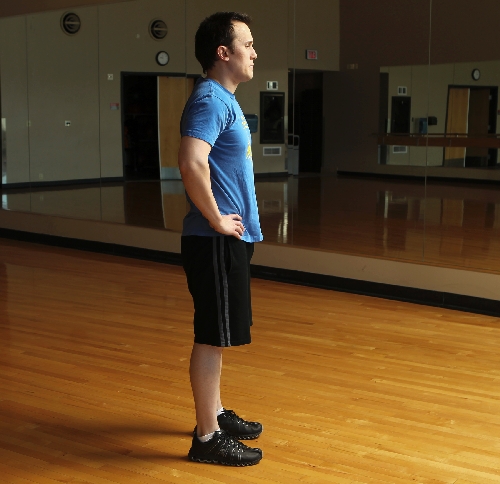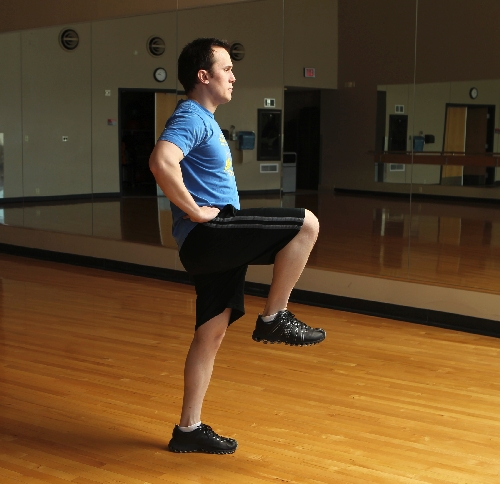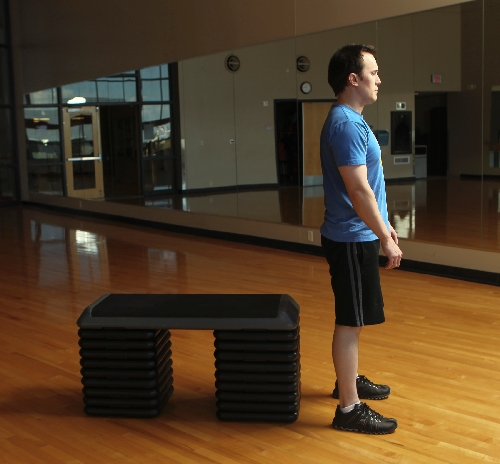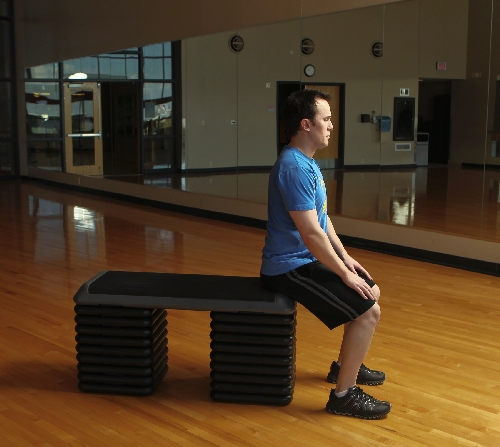Senior muscles: Exercise can help ease drag of getting older




You’re feeling old. Everything seems to hurt. Nothing works like it used to. You swallow pills at every meal. The only consolation is that your eyesight isn’t good enough to notice what’s left of your hairline. Before you take the Harley out for one last ride, you should read this column.
Whether you are a senior or will be one in the next 30 years, there are things to consider to ensure your golden years are filled with good times.
A client once described what I would need to do to feel what it’s like to exercise at a seasoned age. He said, “Run five miles, spin around until you’re dizzy, have someone beat up on you a bit and then start your workout.”
The body deteriorates with age. Until we find the fountain of youth, a few things you can expect are a decreased attainable heart rate and loss of muscle mass, balance, connective tissue elasticity and bone density. Your body won’t absorb protein like it once did either.
It is common for active young-at-hearts to have an accompanying issue or two when they come in for training. A knee might creak when you walk. Diabetes, arthritis or a heart condition may convince you that there is little you can do to stay healthy. Understanding the affliction can help trainers know how to help you get in good shape in spite of the physical challenges. The trick is to be educated and dedicated.
Half of those older than 65 have arthritis. Whether it be rheumatoid or osteoarthritis, exercise is one key to improvement. Strength training has been shown to relieve arthritis symptoms. Conversely, joint pain increases with inactivity. Just do your routine slowly and work through different progressions of various exercises.
Core and balance training are important because those with osteoarthritis can experience decreases in strength and proprioception. Reducing repetitions to 10 to 12 will keep you from overloading the joints. If you experience a flare-up, discontinue exercise until the inflammation decreases.
Osteopenia is the precursor to osteoporosis 1 and 2. People with osteoporosis suffer from decreased bone mineral density. The main areas affected are the femur and the lower lumbar vertebrae. Exercise is recommended because it aids in bone remodeling. When stress is placed on the musculoskeletal system your bones become denser. You may want to increase your calcium intake. Also, cut back on alcohol consumption and quit smoking.
Resistance, balance and core training should be in your exercise schedule. Bone density takes time to build up. Dedicate 6 to 12 months to a program before expecting bone density scans to reveal your efforts.
Diabetes is fought on the gym floor, too. Exercise enhances the uptake of glucose. It also decreases tissue sensitivity and can prevent Type 2 diabetes. Start with walking and low-impact activity. Resistance training is OK. Self-myofascial release, or foam rolling, is not advised for those with peripheral neuropathy (loss of protective sensation in the feet and legs).
To summarize general guidelines: Exercise is beneficial. Get with a trainer so he or she can teach you specific exercises. Your routine should be one with slow progressions. Train flexibility and range of motion as well as postural control. For those of you who are still a few years away from retirement, learn the healthy habits now and you can thank yourself in 30 years.
Healthy eating should be in your arsenal. If you’re limited physically, make up for it with your better eating. Have your nutrition so dialed in that your physician asks you for advice. Keep a food log and know your macronutrient balances. Be educated and dedicated.
Supplements can improve your overall fitness; I recommend a multivitamin.
If you have a fitness goal, consider glucosamine. It lubricates the joints. It will take a few weeks to kick in and when it does you will notice that you don’t notice it. Because when joints are lubricated they don’t hurt as much.
Fish oil is another good supplement. It contains essential fatty acids and helps to lower cholesterol. It reduces inflammation and joint pain, improves the skin and aids in healthy weight loss.
I frequently recommend L-glutamine to seniors. It has many benefits, such as repairing the gastrointestinal lining. It also aids in the use of glucose and protein synthesis. It is used to treat arthritis because it repairs damaged cartilage. Those with liver or kidney conditions and Reye’s syndrome shouldn’t use L-glutamine.
Consult your doctor to determine whether certain supplements will react with medications you are taking.
The exercises today will help condition balance, proprioception and posture control, and provide a good form of body weight resistance training.
Chris Huth is a Las Vegas trainer. You can contact him at 702trainer@gmail.com. Before beginning any exercise program, consult your physician.












